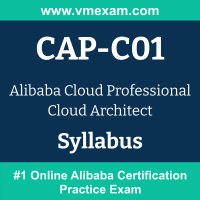 The Alibaba CAP-C01 exam preparation guide is designed to provide candidates with necessary information about the ACP Cloud Architect exam. It includes exam summary, sample questions, practice test, objectives and ways to interpret the exam objectives to enable candidates to assess the types of questions-answers that may be asked during the Alibaba Cloud Certified Professional - Cloud Architect exam.
The Alibaba CAP-C01 exam preparation guide is designed to provide candidates with necessary information about the ACP Cloud Architect exam. It includes exam summary, sample questions, practice test, objectives and ways to interpret the exam objectives to enable candidates to assess the types of questions-answers that may be asked during the Alibaba Cloud Certified Professional - Cloud Architect exam.
It is recommended for all the candidates to refer the CAP-C01 objectives and sample questions provided in this preparation guide. The Alibaba ACP Cloud Architect certification is mainly targeted to the candidates who want to build their career in Cloud Computing domain and demonstrate their expertise. We suggest you to use practice exam listed in this cert guide to get used to with exam environment and identify the knowledge areas where you need more work prior to taking the actual Alibaba Cloud Professional Cloud Architect exam.
Alibaba CAP-C01 Exam Summary:
|
Exam Name
|
Alibaba Cloud Professional Cloud Architect |
| Exam Code | CAP-C01 |
| Exam Price | $200 USD |
| Duration | 90 minutes |
| Number of Questions | 50 |
| Passing Score | 70 / 100 |
| Recommended Training / Books | Alibaba Cloud Certified Professional: Cloud Architect |
| Schedule Exam | PEARSON VUE |
| Sample Questions | Alibaba CAP-C01 Sample Questions |
| Recommended Practice | Alibaba Cloud Certified Professional - Cloud Architect Practice Test |
Alibaba ACP Cloud Architect Syllabus:
| Section | Weight |
|---|---|
| Building Enterprise-grade Networks on Alibaba Cloud | 18% |
| Core Infrastructure Deep Dive | 26% |
| Building Highly Available, Performant Cloud Architecture | 22% |
| Delivering Services and Content on Alibaba Cloud | 12% |
| Securing Workloads on Alibaba Cloud | 22% |
